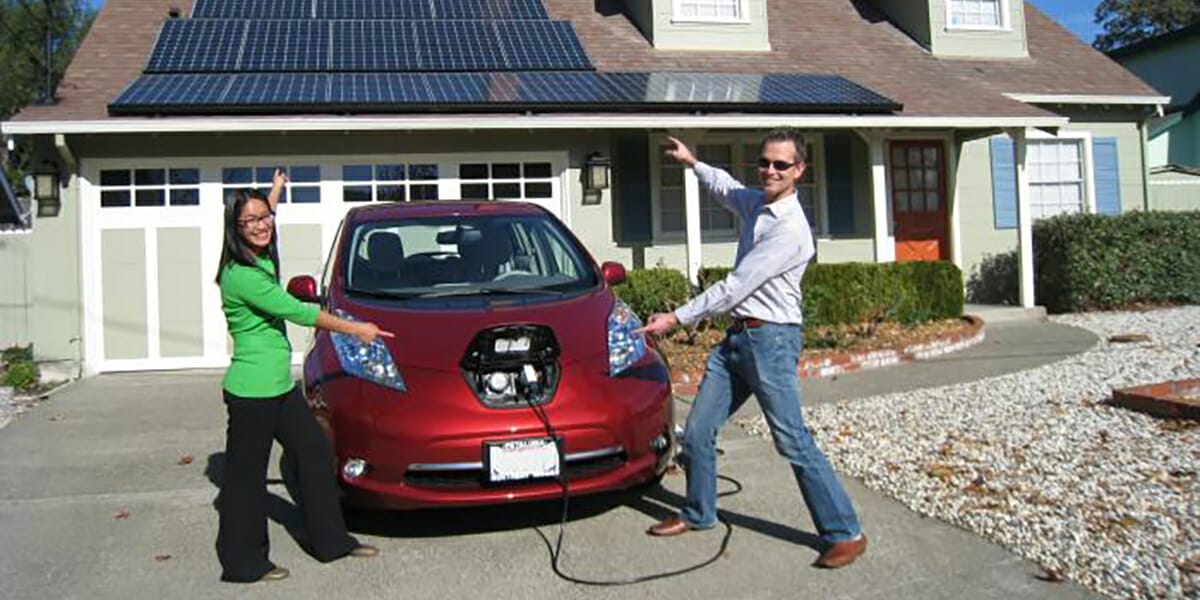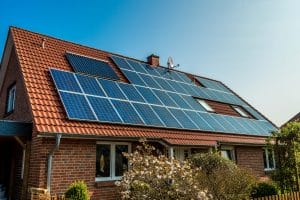Eliminate your gasoline bills. Be the first driver on your block with self-driving technology. Earn clean-air decals to cruise the carpool lane solo. Do your part to reduce the amount of smog in your community. There are lots of reasons to buy an electric vehicle. But did you know that a lot of the same reasons you used to buy an electric car also apply to your decision whether to install rooftop solar panels in your home?
Rooftop solar and electric vehicle ownership have many synergies that will help you be green – and save green.
There are two main reasons someone decides to invest in green technologies. To save the environment, or to save money in the long term. By combining solar panels on your roof with the Tesla in your garage, you can do both!
80 percent of electric vehicle owners said they bought it mostly for the environmental benefits. 67 percent said overall cost savings were another major factor in their decision. Since those are the same benefits as rooftop solar panels, it’s no wonder so many people who have an electric vehicle also have rooftop solar panels on their home. As many as 32 percent of electric vehicle owners also have rooftop solar, compared to 13 percent among gas powered vehicle owners (cleantechnica).
But those numbers can – and should – be higher. Let’s look at some of the ways combining solar panels on the house and an electric vehicle in the garage can improve your green game – both environmentally and financially.
Benefits of electric vehicles for the environment
There are three types of cars that use electricity for power. They differ on how much of the total power the car uses is actually from electricity instead of gasoline.
- BEV or Battery Electric Vehicles (Tesla BMW i3, Nissan LEAF)
- PHEV or Plug-in Hybrid Electric Vehicles (Chevy Volt, Ford Energi), and
- HEVs or Hybrid Electric Vehicles (Prius, Civic Hybrid).
It’s easy to say that the BEV fully electric cars are the “pro-level” of environmental-minded vehicles. BEV fully electric vehicles don’t have any “tailpipe emissions” at all.
However, emissions out of the car itself is only part of the carbon footprint story. Each mile driven in a Tesla or other BEV car is still responsible for what the industry calls the “well to wheel” emissions.
Energy still must come from somewhere, and every vehicle needs some form of generated power to move it and you the passenger forward. Whether it be a diesel-powered truck, a gasoline powered sedan, an electric powered car, or a person-powered bicycle.
You must consider how the electricity that is powering your vehicle is generated. If the electricity in your outlet comes from coal or natural gas, you’re still using fossil fuels to power your car – just somewhere else. In the worst-case scenario, the total well to wheel emissions of an electric vehicle is still 4,450 pounds of CO2 per year. Or 50 percent of the average gas-guzzler next door.
Environmental benefits of powering EVs with rooftop solar
While California leads the country in non-hydro renewable power, about 44 percent of California’s electricity still comes from fossil fuels. Almost all of that is from natural gas. Only one coal-fired plant is still in operation in California, the Argus plant in Inyo County.
Natural gas is cleaner burning than coal. A new natural gas plant emits about half the CO2 of a new coal plant. However, about 1.3 pounds of CO2 are released for every kilowatt hour of natural gas-generated electricity.
Adding rooftop solar panels to your home can help bring those numbers down. According to the U.S. Energy Information Administration, powering an average home with solar instead of fossil fuel-generated electricity has a similar carbon impact as planting 150 trees.
Rooftop solar would also greatly reduce nitrous oxide, sulfur dioxide, and particulate emissions from power generation.
That’s why electric vehicle owners should strongly consider rooftop solar panels. Reduce the emissions from power generation… reduce gasoline vehicle emissions… it’s a win-win. How your vehicle is powered with electrical energy from the grid should be an important consideration in your BEV purchasing decision. Is there really a point in buying a Tesla and powering it with electricity generated from coal?
Other benefits of rooftop solar-powered BEV
Transmission loss: Even the greenest wind, solar, or hydro power, but generated hundreds of miles away, isn’t as efficient as rooftop solar generated within your own neighborhood. About 10 percent of electricity generated in California is lost between the power plants and your power outlet. Rooftop solar eliminates about 30 percent of those losses.
Total cost of ownership sticker shock: Rooftop solar can also help reduce the sticker shock of your electric bill after charging your new electric vehicle for a month. Driving an electric vehicle still takes energy. The energy isn’t coming from gasoline purchased at the local gas station. It comes from the electrical grid. While you get to drive on by past those gas stations, you will now have to pay the electrical company for that energy.
Out of pocket costs of installing rooftop solar have come down a lot, making rooftop solar on your home a great way to power the electric car in your garage. Green Champions and Savings Seekers both should be looking at rooftop solar for their electric car. Or an electric car to use the power generated by their rooftop solar panels.
Lower overall bills. Doing your part to help protect air and water quality in California. Reducing carbon emissions to benefit the whole planet. When you combine rooftop solar and electric vehicles, you get to leverage the benefits of each and combine them in ways that help the Earth and your wallet far more than either one by themselves.





